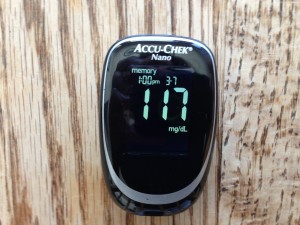I spent some time with a women’s group this past weekend and something very important came up: thriving comes from the positive while surviving comes from the negative. I thought about that a little bit at the time and then I wrote it down, because it made some sense to me.
As diabetes educators, we teach “survival skills” to people who are new to diabetes. These are basically the things someone needs to do to get by outside of the hospital or clinic (check blood glucose levels, take medication, detect and treat low blood glucose). Once that initial time period is over, though, we focus on lifestyle changes and goals that help people thrive for a lifetime. This is not getting by, but getting something out of the situation.
Then I had to ask myself – do I survive or thrive on a typical day? In other words, do I come from a place of negative or positive? I often find it interesting (in a strange sort of way) that I can be so positive about one thing and yet negative about another. I would like to think of myself as an “owner” not a “victim.” And thinking in terms of surviving or thriving is another way to look at it. Once again, no matter how we slice it, positive attitude comes out on top.







